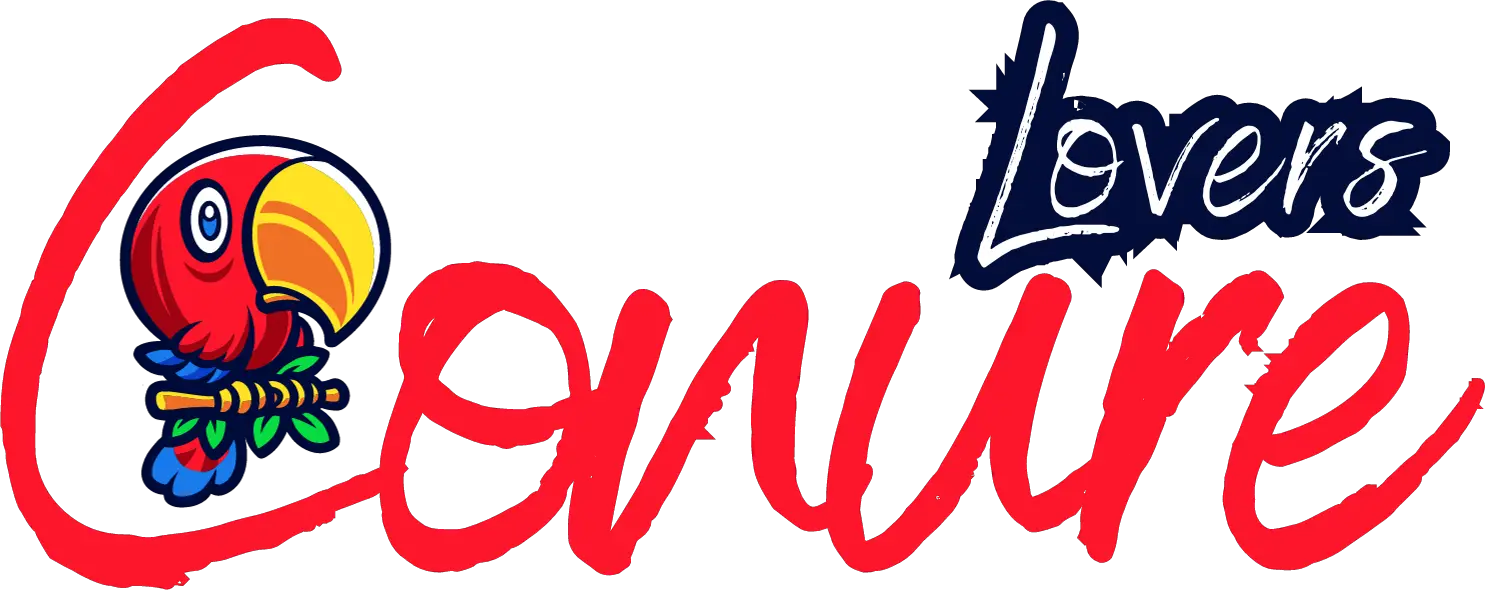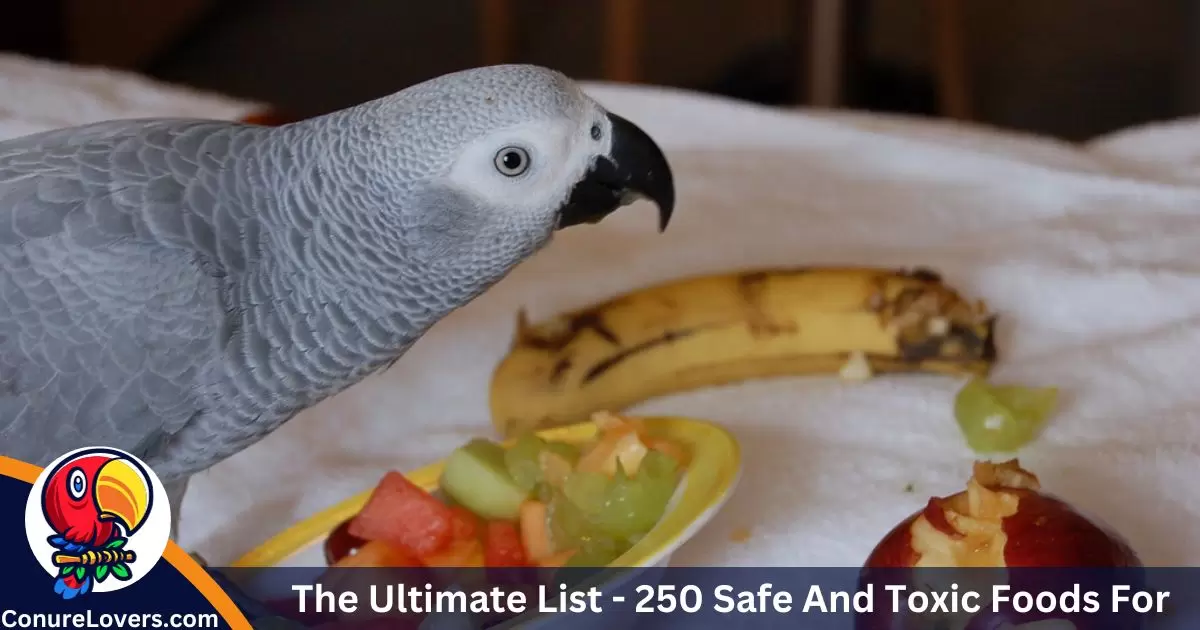What’s safe for your parrots to munch on? Wondering what to steer clear of? Check out this list of over 250 items, and growing! If you’re unsure about a specific food, use your browser’s “search” or “find in page” feature. Click on underlined items for detailed articles on their safety.
What this table CAN do:
Here’s a compilation of general information about various foods, sourced from credible outlets including avian nutritionists. We’ll offer a “to the best of our knowledge” safety indicator, relying on our assessment of each food item’s nutritional content.
What this table CANNOT do:
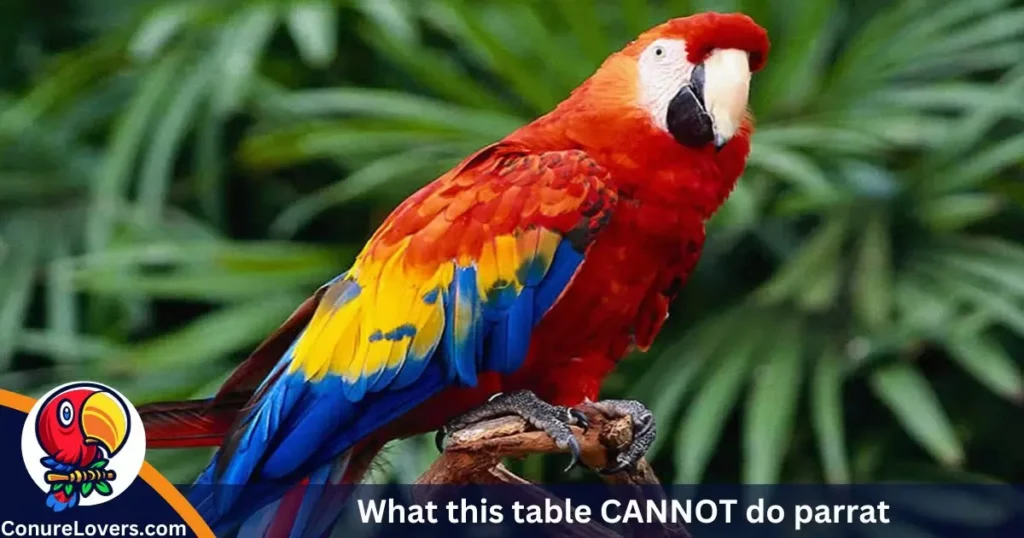
- Prescribe Diets for Specific Species: Different parrot species have unique dietary needs. Always research your specific parrot species to create a diet tailored to their requirements. Cross-check information from various sources for a comprehensive understanding.
- No Absolute Safety Guarantee: Safety or toxicity of food depends on factors like bird size, quantity consumed, interactions with other foods, environmental conditions, individual health, and specific dietary needs. We cannot guarantee absolute safety. Monitor your bird’s well-being closely.
- Consult with Professionals: When in doubt, seek advice from avian nutritionists or avian veterinarians. Their expertise ensures accurate guidance tailored to your bird’s individual needs
Read Also: How To Clip A Conures Wings?
Dairy
Most parrots are lactose-intolerant. While dairy is not necessarily toxic, it can lead to stomach upset and diarrhea. Many dairy products are high in fat, sugar, or salt, which is not healthy if fed frequently. Opt for low/no lactose, low-fat, and additive-free dairy products or simply avoid them.
| CATEGORY | FOOD ITEM | Is it Safe for Parrots? | REMARKS |
| Dairy | Milk (from animals) | Avoid | Parrots can’t digest lactose, may cause stomach upset |
| Dairy | Milk (from plants) | Depends | Nut milk (almond, etc.) unsweetened and unflavored are generally okay. Avoid bean milk. |
| Dairy | Butter | Limited | Full of fat; avoid (better than margarine) |
| Dairy | Cheese | Limited | Parrots cannot digest lactose, may cause stomach upset |
| Dairy | Cream (sour, whipped, etc.) | Limited | Full of fat; avoid |
| Dairy | Ice cream | Limited | Parrots cannot digest lactose; high in fat and sugar. Avoid alcoholic or chocolate ice cream. |
| Dairy | Margarine | Limited | Full of fat; avoid |
| Dairy | Yoghurt | Yes | Yoghurt with live cultures has no lactose, therefore is safe. Limit flavored/sweetened yoghurts (high in sugar). |
Eggs
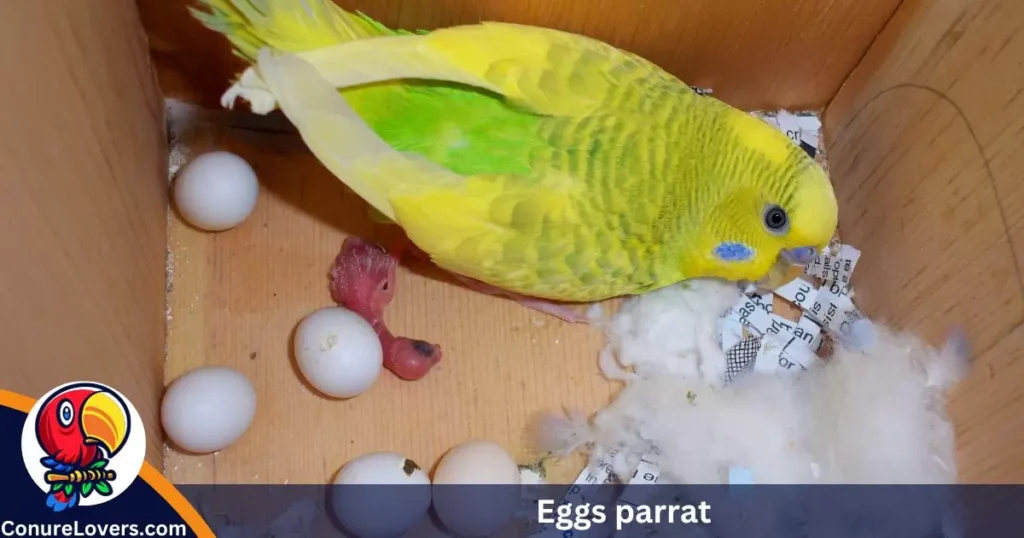
Eggs are sometimes included in parrot diets as a protein source. However, note that high protein diets may lead to hormonal challenges. Some aviculturists oppose animal protein for parrots, as they don’t often consume such proteins in the wild.
| CATEGORY | FOOD ITEM | Is it Safe for Parrots? | REMARKS |
| Eggs | Eggs | Yes | Excellent source of vitamin A, calcium, and protein. Ideal for breeding birds. Feed boiled or fried (without oil). Never offer raw or undercooked. |
Flowers/teas
Avoid feeding any caffeinated teas to your parrots, but flower teas are generally safe. Offer flowers in moderation and variety, considering potential medicinal effects. Edible fresh or dried flowers (not those for craft-making!) can also serve as enriching foraging material for your pet parrots.
| CATEGORY | FOOD ITEM | Is it Safe for Parrots? | REMARKS |
| Flowers/teas | Carnation | Limited | Avoid dyed varieties. |
| Flowers/teas | Chamomile | Limited | Contains antimicrobial activities, aiding in treating infections and reducing swelling. |
| Flowers/teas | Jasmine | Limited | Strengthens immunity and treats liver diseases. |
| Flowers/teas | Passion flower | Limited | Contains cyanide, a toxic compound. Feed in moderation. |
| Flowers/teas | Rooibos | Limited | Tannin-free, enhances mineral and vitamin absorption. |
| Flowers/teas | Calendula | Yes | Anti-inflammatory properties. Good for infections and fungus. Best used in salads. |
| Flowers/teas | Echinacea | Yes | Anti-inflammatory properties. |
| Flowers/teas | Green tea | Yes | Rich in antioxidants and vitamins. Boosts immune system and metabolic rate. Dissolve in parrot’s drinking water. |
| Flowers/teas | Hibiscus | Yes | Good source of vitamin C. Relieves high blood pressure and high cholesterol. |
| Flowers/teas | Rose | Yes | Good source of vitamin C. |
| Flowers/teas | Rose hips | Yes | Very high in vitamin C and anti-inflammatory properties. |
Fruits
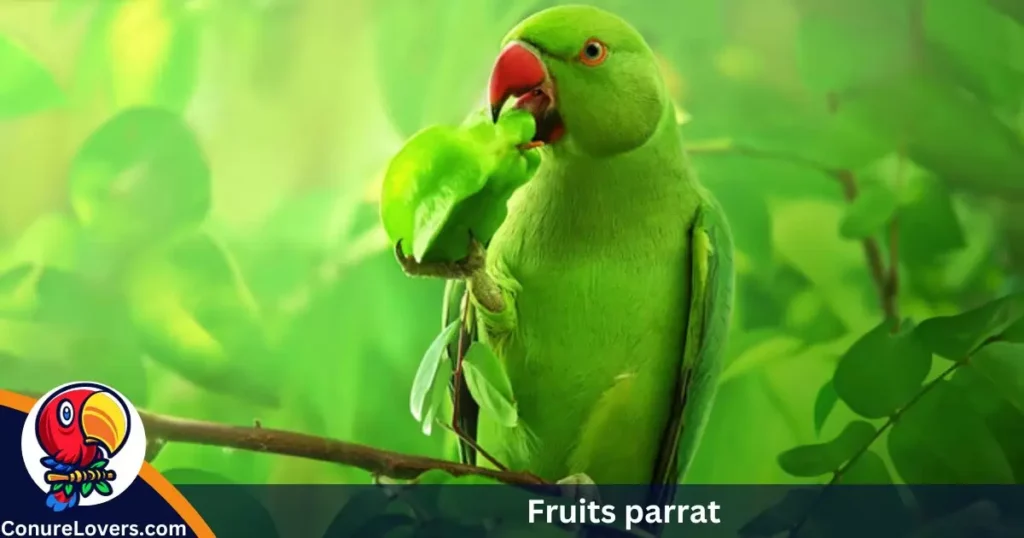
General Remarks: Other than a few toxic fruits and fruit parts (avocado, avocado stones, pits of pitted fruits like peach, cherry, apricot, and apple seeds), most fruits are generally safe. Include fruits in your parrots’ diet but be cautious with amounts due to high sugar content.
| CATEGORY | FOOD ITEM | Is it Safe for Parrots? | REMARKS |
| Fruits | Fruit, dried | Depends | Dried fruits with no additives like preservatives and sugars are generally safe. |
| Fruits | Clementine | Limited | Highly acidic, feed in moderation. |
| Fruits | Mandarin | Limited | Highly acidic, may cause stomach upset if given too much or too often. |
| Fruits | Olive | Limited | High in fats and sodium chloride, may lead to healthy and high blood pressure. |
| Fruits | Pomelo (pummelo, shaddock) | Limited | Highly acidic, feed in moderation. |
| Fruits | Starfruit (carambola) | Limited | Seeds can be bitter and unpleasant to taste. |
| Fruits | Tamarind | Limited | No nutritional value, may cause allergic reactions if consumed excessively. |
| Fruits | Avocado | No | Flesh, pit, and skin are highly toxic; contains persin, a toxic chemical compound. |
| Fruits | Banana | Yes | Remove peels; may contain high amounts of pesticides. |
| Fruits | Blackberry | Yes | Excellent source of anthocyanins, anti-inflammatory properties. |
| Fruits | Blackcurrant | Yes | Excellent source of vitamin C. |
| Fruits | Blueberry | Yes | High in nutrients and lower in calories. |
| Fruits | Cantaloupe | Yes | Packed with vitamin A, vitamin C, and potassium. Remove rinds; not toxic but hard for parrots to tear. |
| Fruits | Coconut | Yes | Unique blend of minerals and vitamins. Avoid dessicated coconut; soak before feeding. |
| Fruits | Cranberry | Yes | Good source of vitamin C, antioxidants, fiber, and minerals. |
| Fruits | Custard apple (Cherimoya) | Yes | Avoid seeds and pits; flesh has anti-inflammatory properties. |
| Fruits | Date | Yes | Promotes healthy blood flow. |
| Fruits | Dragonfruit (pitaya) | Yes | Very high in fiber; feed in moderation. |
| Fruits | Durian | Yes | Rich in vitamin C, folic acid. Husks are inedible. |
| Fruits | Elderberry | Yes | Offer ripe elderberries only; excellent source of vitamin C. |
| Fruits | Fig | Yes | Rich in vitamins, minerals, and fiber. |
| Fruits | Gooseberry | Yes | Tart taste; rich in vitamin A and vitamin C. |
| Fruits | Grape | Yes | High in sugars; feed as a treat. |
| Fruits | Guava | Yes | Good source of vitamins; wash thoroughly to remove pesticides. |
| Fruits | Honeydew | Yes | Good source of fiber for digestive tract health. |
| Fruits | Jackfruit | Yes | Delicious snack; avoid overeating. |
| Fruits | Kiwi | Yes | Excellent source of dietary fiber, antioxidants, and vitamin C. Feed in moderation; slightly acidic. |
| Fruits | Kumquat | Yes | Healthy fruit rich in vitamin C and anti-inflammatory properties. |
| Fruits | Longan | Yes | Avoid peels (pesticides); seeds are tough and slightly toxic. |
| Fruits | Loquat | Yes | Remove toxic seeds and pits. |
| Fruits | Lychee (litchi) | Yes | Avoid peels (pesticides); seeds are tough and slightly toxic. |
| Fruits | Mango | Yes | Wash pit thoroughly before feeding. |
| Fruits | Mangosteen | Yes | Avoid skin (contains toxic liquid) and large seeds; flesh is rich in vitamins and minerals. |
| Fruits | Mulberry | Yes | Offer as a treat; great source of fiber, minerals, and vitamins. |
| Fruits | Nectarine | Yes | Avoid cyanide-containing seeds and pits. Feed fresh nectarines; dried ones may contain sulphates. |
| Fruits | Orange | Yes | Highly acidic; feed in moderation. |
| Fruits | Papaya | Yes | Excellent source of fiber, fat, and protein; keeps parrots fit and healthy. |
| Fruits | Passion Fruit | Yes | Wash well to remove pesticides. |
| Fruits | Peach | Yes | Avoid cyanide-containing pits; flesh is safe. |
| Fruits | Pear | Yes | Rich in vitamin A and calcium. |
| Fruits | Persimmon | Yes | Feed when ripe; unripe ones contain toxic tannins. |
| Fruits | Pineapple | Yes | Good source of vitamins, minerals, antioxidants, and enzymes. |
| Fruits | Plum | Yes | Avoid cyanide-containing pits; flesh is safe. |
| Fruits | Pomegranate | Yes | Full of antioxidants and health benefits; pit is not edible. |
| Fruits | Prickly Pear | Yes | Remove skin before feeding. |
| Fruits | Prune | Yes | Avoid cyanide-containing pits; safe when pitted. |
| Fruits | Raisin | Yes | Excellent source of vitamins and nutrients. |
| Fruits | Rambutan | Yes | Avoid peels (pesticides); seeds are tough and slightly toxic. |
| Fruits | Raspberry | Yes | Clean well before feeding; may contain parasites. |
| Fruits | Rose apple (jambu) | Yes | Good source of vitamin C, vitamin A, iron, calcium, and fiber. |
| Fruits | Soursop | Yes | Seeds are toxic; avoid consumption. |
| Fruits | Strawberry | Yes | Loaded with vitamin C and antioxidants. |
| Fruits | Tangerine | Yes | Entire fruit, flesh, peels, and seeds are safe. |
| Fruits | Watermelon | Yes | Seeds, flesh, and rinds are all okay. |
| Fruits | Wolfberry (goji berry) |
Insects
Insects are occasionally consumed by parrots in the wild as part of their diverse diets. Some insects are safe to feed in moderation as they offer valuable protein sources.
| CATEGORY | FOOD ITEM | Is it Safe for Parrots? | REMARKS |
| Insects | Worms | Yes | Mealworms, in particular, are rich in proteins. |
Meat
Meat can serve as an alternative protein source for parrots. However, some are cautious about feeding animal proteins due to processing, hormone injections, high fat content, and preparation methods (cooking with oil, salt, etc.). Never feed raw meat to your birds.
| CATEGORY | FOOD ITEM | Is it Safe for Parrots? | REMARKS |
| Meats | Meat | Depends | Chicken and turkey are the healthiest but must be cooked with no oil or seasoning. |
| Meats | Seafood | Yes | Safe if free of pollutants, toxins, and heavy metals. |
Vegetables
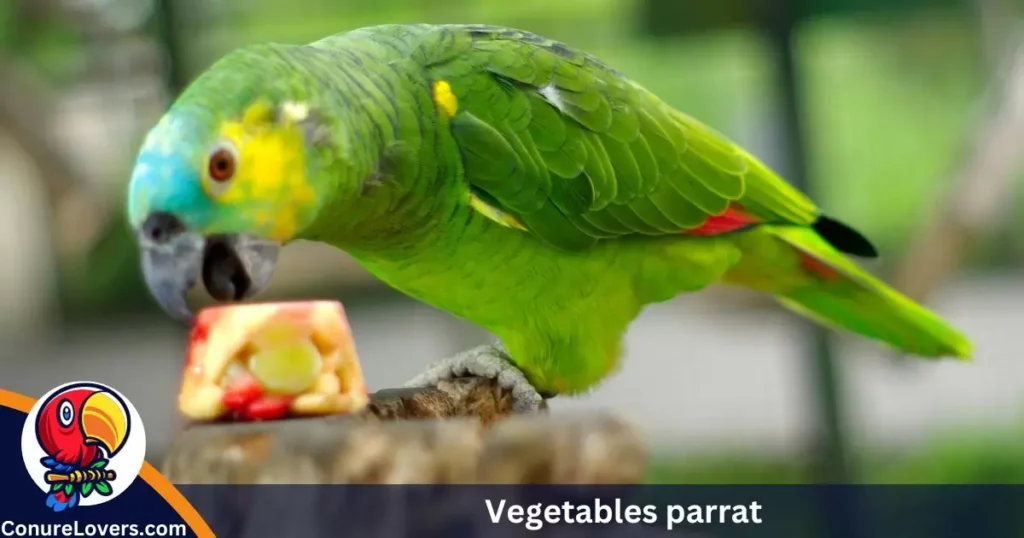
Parrot diets should predominantly include raw vegetables, offering a rich mix of essential nutrients such as vitamins, antioxidants, minerals, and fiber. Prioritize washing vegetables thoroughly to eliminate pesticides and herbicides.
| CATEGORY | FOOD ITEM | Is it Safe for Parrots? | REMARKS |
| Vegetables | Fiddlehead | Depends | Some types safe, others toxic. Contains omega-3, omega-6, and vitamin C. Use caution. |
| Vegetables | Kaffir lime leaves | Depends | Not toxic, but may have pesticides. Safe if untreated. Some parrots may not like the taste. |
| Vegetables | Tomatillo | Depends | Fruits safe, leaves and stems toxic. Exercise caution. |
| Vegetables | Garlic | Limited | Tiny amounts are safe, but high amounts may lead to blood anemia. Exercise moderation. |
| Vegetables | Horseradish | Limited | High in toxic mustard oil. Approach with caution. |
| Vegetables | Leek | Limited | Small amounts are safe, but excess may lead to blood anemia. Use in moderation. |
| Vegetables | Lentils | Limited | Good protein source but cook to remove anti-nutrients. Moderation is key. |
| Vegetables | Mushrooms | Limited | Fresh, store-bought mushrooms in small quantities are acceptable. UV light exposure is good. |
| Vegetables | Onion | Limited | Tiny amounts are safe, but excess may lead to blood anemia. Use sparingly. |
| Vegetables | Onion, spring | Limited | Small amounts are safe, but excess may lead to blood anemia. Use in moderation. |
| Vegetables | Rhubarb | Limited | Leaves unsafe; stalks contain oxalic acid (cook for safety). Exercise caution. |
| Vegetables | Shallots | Limited | Small amounts are safe, but excess may lead to blood anemia. Use in moderation. |
| Vegetables | Tomato | Limited | High acid content. Vines and leaves are toxic. Use with caution. |
| Vegetables | Cassava | No | Contains cyanide; highly toxic. Avoid entirely. |
| Vegetables | Amaranth leaf | Yes | Rich in lysine and methionine. Contains antioxidants. Suitable for parrots. |
| Vegetables | Arrowroot | Yes | Low in fats, suitable for weight management. Safe for parrots. |
| Vegetables | Artichoke | Yes | Excellent source of vitamin C, potassium, and fiber. Safe for parrots. |
| Vegetables | Arugula | Yes | Good source of vitamin A and C. Supports immune health in parrots. |
| Vegetables | Asparagus | Yes | High in vitamins but not a natural food for parrots. Feed in moderation. |
| Vegetables | Bamboo shoot | Yes | Safe if untreated. Cook for 20 minutes to remove cyanogenic glycosides. |
| Vegetables | Bean, black | Yes | Safe when cooked. Avoid raw beans containing hemagglutinin. Suitable for parrots. |
| Vegetables | Bean, cannellini | Yes | Cook thoroughly before feeding. Raw or undercooked beans are harmful. Safe when cooked. |
| Vegetables | Bean, fava | Yes | Raw or dried beans toxic. Contain hemagglutinin. Cook before offering to parrots. |
| Vegetables | Bean, garbanzo | Yes | High in nutrients; cook before feeding. Avoid raw garbanzo beans. Suitable for parrots. |
| Vegetables | Bean, green | Yes | Excellent source of fiber and essential vitamins. Suitable for parrots. |
| Vegetables | Bean, kidney | Yes | Ensure thorough cooking. Good protein and fiber source for parrots. |
| Vegetables | Bean, lima | Yes | Safe when cooked. Offer in moderation. Suitable for parrots. |
| Vegetables | Bean, mung | Yes | Sprout before feeding. Unsafe when dry. Suitable for parrots in moderation. |
| Vegetables | Bean, pinto | Yes | Cook or sprout before feeding. Raw pinto beans are unsafe. Suitable for parrots. |
| Vegetables | Bean, red (adzuki) | Yes | Cooked red beans are safe. Raw, dry beans contain toxic hemagglutinin. Suitable for parrots. |
| Vegetables | Bean, soy (edamame) | Yes | Good protein source. Cook well before serving. Suitable for parrots. |
| Vegetables | Beet (beetroot) | Yes | Rich in vitamins and minerals. Promotes healthy blood flow. Suitable for parrots. |
| Vegetables | Bell peppers | Yes | Excellent source of vitamin C. Safe for parrots. |
| Vegetables | Bitter melon | Yes | High in vitamin C, supporting parrot’s immune system. Suitable for parrots. |
| Vegetables | Bok Choy (pak choi) | Yes | Rich in calcium, promoting muscle health and bone density. Suitable for parrots. |
| Vegetables | Broccoli | Yes | Nutrient-rich. Wash thoroughly if feeding raw. Suitable for parrots. |
| Vegetables | Brussel sprout | Yes | Abundant in antioxidants and Omega-3 fatty acids. Suitable for parrots. |
| Vegetables | Burdock root | Yes | Source of inulin and fiber, aiding digestion in parrots. Suitable for parrots. |
Miscellaneous
| CATEGORY | FOOD ITEM | Is it Safe for Parrots? | REMARKS |
| Miscellaneous | Honey | Depends | Harbors bacteria and mold; may contain herbicides and pesticides. Not suitable for parrot consumption. |
| Miscellaneous | Spicy food | Depends | Parrots enjoy spicy food, but some spices like cassia/Chinese cinnamon (high in coumarin) can be toxic, causing liver damage. Exercise caution. |
| Miscellaneous | Aloe vera | Yes | Promotes healthier liver functions. Avoid leaves and sap, which contain aloin causing intestinal irritations. |
| Miscelaneous | Grass | Yes | Aids parrots in regenerating an |

I’m Justin Taylor, your Conure Buddy Guide from “Conure Lovers.” Join me on a journey to discover simple and joyful ways to care for your feathered companion. Let’s make each day with your conure special!
